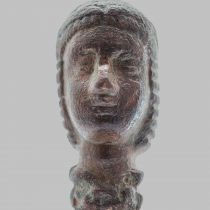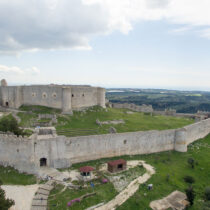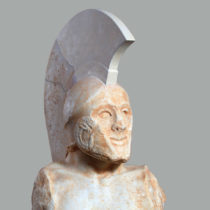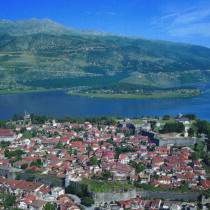Traces from the past
An international research team led by the Max Planck Institute for Evolutionary Anthropology in Leipzig, Germany, has for the first time successfully isolated ancient human DNA from a Paleolithic artefact: a pierced deer tooth discovered in Denisova Cave in southern Siberia.
Human ancestors preferred mosaic landscapes and ecosystem diversity
A new study published in the journal Science by an international team finds that early human species adapted to mosaic landscapes and diverse food resources, which would have increased our ancestor’s resilience to past shifts in climate.
Two 7th century antiquities to be returned to China
Manhattan District Attorney Alvin L. Bragg, Jr., announced the return of two 7th-century stone carvings from a funerary platform, to China.
Further dark secrets of Batavia shipwreck laid bare
An archaeological research project spanning five years has shed new light on a tragic chapter in Australian history, revealing a wealth of evidence.
Isotope data reveal millennia of ecological change in Southern Africa
A new paper in Communications Earth & Environment uses plant wax biomarkers from archaeological sediments to understand human-environment interactions in mountain ecosystems for the past 60,000 years.
A new app brings the Acropolis to life
The COSMOTE CHRONOS application is a one-of-a-kind free mobile application for smartphones and tablets designed for the archaeological site of the Acropolis of Athens.
Searching for ancient bears in Alaskan cave led to important human discovery
The first people to live in the Americas migrated from Siberia across the Bering land bridge more than 20,000 years ago.
Chimpanzees combine calls to communicate new meaning
Similar to humans, chimpanzees combine vocalizations into larger communicatively meaningful structures. UZH researchers suggest that this ability might be evolutionarily more ancient than previously thought.
New study offers insight on evolution of the largest of the large dinosaurs
Sauropods were the largest animals ever to walk the Earth. No other dinosaur or land mammal even comes close.
Nose shape gene inherited from Neanderthals
Humans inherited genetic material from Neanderthals that affects the shape of our noses, finds a new study led by UCL researchers.
Research Associate, Metropolitan Museum of Art, Department of Egyptian Art
The Department of Egyptian Art at The Met has an opening for a Research Associate who will work on an upcoming exhibition about ancient Egyptian gods.
Late Pharaonic and Early Christian finds located in Meir
Byzantine era buildings and Late Period burials have been located by the Egyptian archaeological mission operating in the archaeological site of Meir, near the city of el-Qusiya, Assiut Governorate.
Recent advances on historical artifacts and their preservation
Because we don’t have crystal balls to show us how the world used to look, scientists must rely on preserved artifacts and specimens to provide the details.
Hoard of Roman bronze vessels from Wilcot
The Wiltshire Museum has acquired an important hoard of four bronze vessels, probably buried at the end of Roman Britain, 1,600 years ago.
Three antiquities repatriated to Yemen
Manhattan District Attorney Alvin L. Bragg, Jr., announced on April 28 the return of three antiquities valued at $725,000 to the people of Yemen.
A coin of Queen Fastrada and Charlemagne
A Carolingian coin has recently been acquired by the Centre Charlemagne in Aachen which represents an entirely unexpected and truly historic addition to our knowledge of the reign of Charlemagne, as it bears the name of his wife Fastrada.
Alpha Bank presents “The other side of the coin”
To celebrate the 50th anniversary of the creation of the world-famous Alpha Bank Numismatic Collection, the Bank organizes major retrospective exhibition.
Alexandria’s Shatby Necropolis now accessible to the public
The site has been excavated, restored and upgraded.
Archaeologists map hidden Northern Territory landscape
Scientists at Flinders University have used sub-surface imaging and aerial surveys to see through floodplains in the Red Lily Lagoon area of West Arnhem Land.
Longstanding cultural continuity at oldest occupied site in West Africa
Stone tools recovered from near the Senegalese coast extend occupation of the region back to 150 thousand years ago.
Book review: M. Cook, Rewriting History: The decipherement of Linear A
In his work, Cook applies data-sorting expertise to decipher Linear A and proposes a boldh theory.
Malvern Priory medieval stained glass restored and reinstalled
Adam now can be seen holding a yellow apple, and Eve holding another whilst the devil looks on from a tree.
Reconstruction of the ceremonial chariot from Civita Giuliana
A story of recovery, legality and the enhancement of a unique find on display for the first time at the Museo Nazionale Romano from 4 May.



























